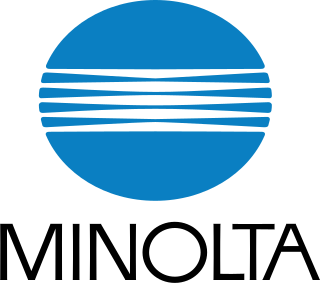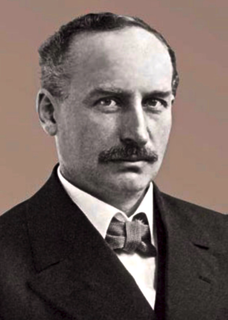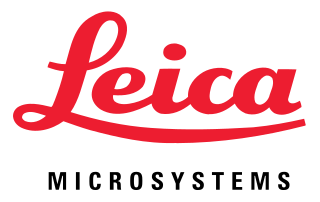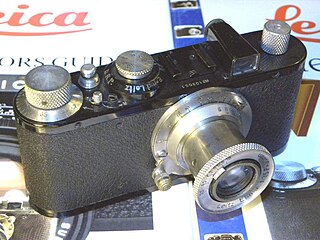
Leica Camera AG is a German company that manufactures cameras, optical lenses, photographic lenses, binoculars, rifle scopes and microscopes. The company was founded by Ernst Leitz in 1869, in Wetzlar, Germany.

Minolta Co., Ltd. was a Japanese manufacturer of cameras, camera accessories, photocopiers, fax machines, and laser printers. Minolta Co., Ltd., which is also known simply as Minolta, was founded in Osaka, Japan, in 1928 as Nichi-Doku Shashinki Shōten. It made the first integrated autofocus 35 mm SLR camera system. In 1931, the company adopted its final name, an acronym for "Mechanism, Instruments, Optics, and Lenses by Tashima".
ACCO Brands Corporation is an American manufacturer of office products. It was created by the merger of ACCO World from Fortune Brands with General Binding Corporation (GBC).
Duo-Tang was a brand name for paper folders made of cardstock paper. They are used to bind multiple sheets of paper by bending embedded brass fasteners through the holes of the paper and folding them down to keep them in place. Some models have three teeth on the fastener, and some have six. They could be different colours such as blue, green, red, orange, yellow and black. They were often used as an organization tool for multiple pages of one subject, chiefly by elementary school students.
Esselte is a manufacturer and marketer of office products and business supplies with subsidiaries in 25 countries and sales in over 120 countries. Esselte makes files, binders, folders, covers, staplers, letter trays and computer accessories under the Esselte, Leitz, Oxford, Pendaflex, Rapid and Xyron brands. Customers range from wholesalers and direct marketers to office superstores and mass retailers.

The M39 lens mount is a screw thread mounting system for attaching lenses to 35 mm cameras, primarily rangefinder (RF) Leicas. It is also the most common mount for Photographic enlarger lenses.

The Wild (Heerbrugg) company was founded in 1921 in Switzerland. The company manufactured optical instruments, such as surveying instruments, microscopes and instruments for photogrammetry among others. The company changed its name several times, first being known as "Heinrich Wild, Werkstätte für Feinmechanik und Optik", then "Verkaufs-Aktiengesellschaft Heinrich Wild's Geodätische Instrumente", later "Wild Heerbrugg AG", later "Wild-Leitz". The company was linked with Leica in 1989, then it became part of Leica Holding B.V. Its subsidiary Leica Geosystems AG became part of the Swedish Hexagon AB Group of companies in 2005.

The Leica Freedom Train was a rescue effort in which hundreds of Jews were smuggled out of Nazi Germany before the Holocaust by Ernst Leitz II of the Leica Camera company, and his daughter Elsie Kuehn-Leitz.

The Leica CL is a 35mm compact rangefinder camera with interchangeable lenses in the Leica M-mount. It was developed in collaboration with Minolta who manufactured it. It first appeared in April 1973 and was released in the Japanese market in November 1973 as the Leitz Minolta CL. Both the Leica CL and Leitz Minolta CL were manufactured in a new Minolta factory in Osaka. In 2017, Leica announced a new digital mirrorless camera, again named Leica CL.

Feuerbach is a borough (Stadtbezirk) of the city of Stuttgart. Its name is derived from the small river of the same name that flows from the neighboring district of Botnang through Feuerbach. Feuerbach is home to one of Germany's biggest industrial giants and is surrounded by the districts of Zuffenhausen, Bad Cannstatt, Stuttgart-North, Stuttgart-West, Botnang and Weilimdorf.
Leitz may refer to several German companies:
Pendaflex is a maker of office filing products headquartered in Melville, NY, USA.

Louis Leitz was a German inventor and founder of Esselte Leitz GmbH & Co KG, trained as a woodturner and also worked as a mechanic.
Dymo Corporation is an American manufacturing company of handheld label printers and thermal-transfer printing tape as accessory, embossing tape label makers, and other printers such as CD and DVD labelers and durable medical equipment.

Leica Microsystems GmbH is a German microscope manufacturing company. It is a manufacturer of optical microscopes, equipment for the preparation of microscopic specimens and related products. There are ten plants in eight countries with distribution partners in over 100 countries. Leica Microsystems emerged in 1997 out of a 1990 merger between Wild-Leitz, headquartered in Heerbrugg Switzerland, and Cambridge Instruments of Cambridge England. The merger of those two umbrella companies created an alliance of the following 8 individual manufacturers of scientific instruments. American Optical Scientific Products, Carl Reichert Optische Werke AG, R.Jung, Bausch and Lomb Optical Scientific Products Division, Cambridge Instruments, E.Leitz Wetzlar, Kern & Co., and Wild Heerbrugg AG, bringing much-needed modernization and a broader degree of expertise to the newly created entity called Leica Holding B.V. group. In 1997 the name was changed to Leica Microsystems and is a wholly-owned entity of Danaher Corporation since July 2005. Danaher is a US venture capital company.

The Leica Standard, Model E was the fourth version of the original 35 mm Leica camera to be launched from Ernst Leitz in Wetzlar, Germany. The concept was conceived by their employee Oskar Barnack in 1913. Production of the camera began in 1925 but it was not until the end of the decade that it was perfected and full-scale production was established.
From the German capture of Denmark and Norway, the Swedish overseas trade during World War II was mainly blocked by the battle of the Atlantic, but Swedish diplomats convinced Germany and the United Kingdom to let through a few vessels, mainly to the United States until their entrance into the war, and neutral countries in Latin America. These transports, called lejdtrafiken, "the safe conduct traffic", were monitored by both powers, and ten of them were sunk during the war. Sweden mainly imported petroleum products and agricultural produce, and exported wood products. Overall, petrol imports to Sweden greatly decreased, and substitute fuels were found.
Carl Kühne KG is a German food manufacturer which mainly produces vinegars and delicacies. As one of the largest vinegar, pickled gherkin and mustard producers in Europe, the family-owned business sells its products in over 50 countries. Kühne produces a range of condiments, salad dressings, pickled foods and sauces. In addition to its products for the end consumer, Kühne also supplies the gastronomy and food industries. Two-thirds of their sales are generated in Germany and one third abroad. Its products are distributed to the fast food and food sectors in Europe, the Middle East, Asia, Africa, Australia and America.
Ernst Leitz GmbH was a German corporation now divided into four independent companies:










